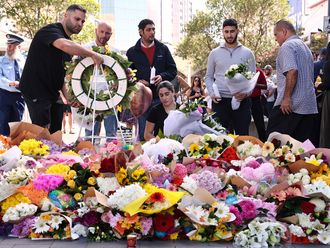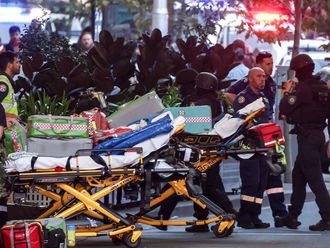United Nations: President Barack Obama warned Thursday the Holy Land was doomed to perpetual bloodshed, unless the world unites behind his plan for a Palestinian state and a secure Israel within a year.
In a sweeping survey of US diplomacy at the United Nations General Assembly, Obama also told Iran the door to nuclear diplomacy was still open, said a global economic depression had been averted and promised to visit Indonesia.
Obama's speech came at a crucial moment of his fledgling Middle East peace effort with the Palestinians threatening a walkout if Israel refuses to extend a settlement building moratorium which expires next week.
He issued the stark warning that if the US-backed initiative failed, Palestinians would never get a state and Israel would never know true security.
"The hard realities of demography will take hold. More blood will be shed. This Holy Land will remain a symbol of our differences, instead of our common humanity," Obama said.
"I refuse to accept that future and we all have a choice to make. Each of us must choose the path of peace," said Obama, wagering a hefty bet with his own political and diplomatic capital.
Obama said he believed that Israeli Prime Minister Benjamin Netanyahu and Palestinian president Mahmud Abbas had the courage to make a deal, but needed support, and called especially for a more proactive role by Arab states.
"We can say that this time will be different - that this time we will not let terror, or turbulence, or posturing, or petty politics stand in the way," Obama said, adding key players must lean tolerance common to Islam, Judaism and Christianity.
"When we come back here next year, we can have an agreement that will lead to a new member of the United Nations - an independent, sovereign state of Palestine, living in peace with Israel."
Obama restated his position that the Israeli settlement moratorium should be extended, but also called on those who want an independent Palestine to "stop trying to tear down Israel."
Abbas told AFP that he welcomed Obama's remarks, "especially his call for a halt of the settlement activities and for the creation of a Palestinian state."
"We also welcome the huge efforts exerted by President Obama and his administration to push forward the peace process" he added.
On a day when Iranian President Mahmoud Ahmadinejad was also to appear on the UN assembly podium, Obama said the door to diplomacy with Tehran was still open, but only for genuine dialogue.
"Let me be clear once more: the United States and the international community seek a resolution to our differences with Iran, and the door remains open to diplomacy should Iran choose to walk through it," Obama said.
"But the Iranian government must demonstrate a clear and credible commitment, and confirm to the world the peaceful intent of its nuclear program," Obama said.
The US president also announced that he would go to Indonesia in November, after having to twice postpone the visit this year due to the Gulf of Mexico oil spill and his push to enact major health care reforms.
The trip to the world's largest Muslim-majority nation, where he spent four years as a boy, will give Obama the chance to speak directly to the Islamic world, following recent controversies over the role of Islam in American life.
Much of Obama's speech was a self assessment of the progress the president believes he has made overseas since taking office 20 months ago.
He said that New York City, which hosts the United Nations told the story of a "difficult decade" as it had suffered the September 11 attacks in 2001, and been the epicenter of the global financial meltdown.
But Obama argued that the policies of his administration and actions of other major powers had pulled the world back from the "brink of depression," though he added more needed to be done to safeguard the recovery.
He said his White House was waging a more effective fight against Al-Qaeda, and chasing extremists in Afghanistan, South Asia and the Horn of Africa, while drawing down in Iraq and building Afghan security capacity.
Obama highlighted his non-proliferation agenda, saying on his watch terrorists were being deprived of nuclear weapons, and noting a comprehensive and historic arms control deal he reached with Russia.
The president also highlighted efforts to fight climate change and to alleviate the humanitarian cost of floods in Pakistan and Haiti's earthquake, and argued democracy and human rights were vital to economic and social development.












